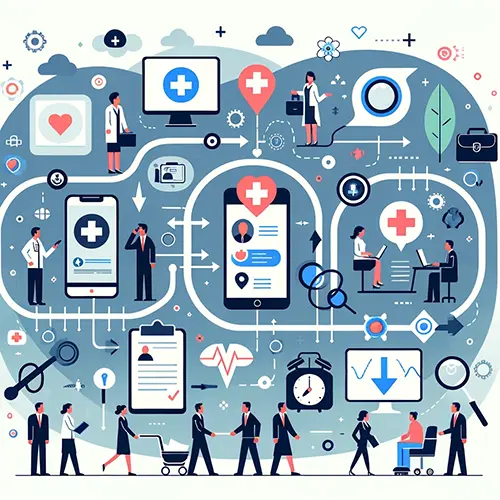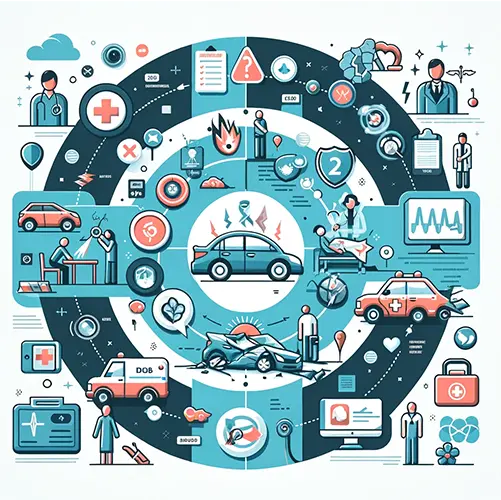
With over two decades dedicated to treating personal injury patients, our expertise highlights the importance of selecting the appropriate doctors to address your needs. This comprehensive guide is tailored to assist you in navigating the complexity of finding the right doctors for your specific injuries following a car accident.
Immediate Steps for Serious Injuries
If you or someone else is seriously injured, do not hesitate to dial 911 immediately. Your health and safety are the utmost priority.
Post-Emergency Care and Routine Check-ups:
Whether you’ve received initial treatment at a hospital or an Urgent Care center, or if you’re contemplating a routine check-up to assess any potential injuries of a car accident, it’s essential to be well-informed before selecting a doctor specializing in auto injury. This guide aims to equip you with valuable insights and tips to make an informed decision in choosing the right doctor for a smooth and effective recovery process.
Table of contents
- Step 1: Rethinking Your Primary Care Doctor for Car Accident Injuries
- Step 2: Finding the Right Doctor That accepts Third-Party Billing
- Step 3: Partner with a Doctor who knows Injury Documentation
- Step 4: Full Disclosure to Your Doctor
- Step 5: Commit to Your Treatment Plan for Optimal Recovery
- Step 6: How a Personal Injury Attorney Can Amplify Your Case
- Why Your Doctor’s Opinion Matters
- Navigating Your Accident Medical Care: Essential Q&A
- Key Takeaways
Step 1: Rethinking Your Primary Care Doctor for Car Accident Injuries
When you’ve been in a car accident, your first thought might be to visit your family doctor. However, it’s essential to understand that a primary care physician may not always be the best option for treating car accident injuries. Here’s why:
Third-Party Billing Challenges
Many primary care clinics do not accept third-party billing, a common payment method for car accident-related medical care. This means you might end up paying out of pocket for a visit that should be covered by the responsible party’s insurance.
Specialization Matters: Primary care doctors are experts in general health and internal medical conditions. However, they might not have the specialized training needed to treat specific injuries from car accidents, such as whiplash or soft tissue damage. These injuries often require the expertise of a doctor who is familiar with the unique challenges of car accident injuries.
Soft tissue damage
Soft tissue injuries, including damage to muscles, skin, and subcutaneous tissue, are common in car accidents and can lead to significant discomfort and long-term issues if not properly treated. These injuries might not be apparent in standard X-rays or imaging and often require specialized care for diagnosis and treatment.
What to Do Instead
If you’ve been in an accident, we recommend reaching out to your primary care physician to discuss your injuries. They can provide an initial assessment and, if necessary, refer you to a specialist who is equipped to handle car accident injuries and accepts third-party billing. This approach ensures you get the specialized care you need without the stress of unexpected medical bills.
By considering these points, you can navigate your post-accident medical care more effectively, ensuring you receive the right treatment for a faster and more comprehensive recovery.
Step 2: Finding the Right Doctor That accepts Third-Party Billing
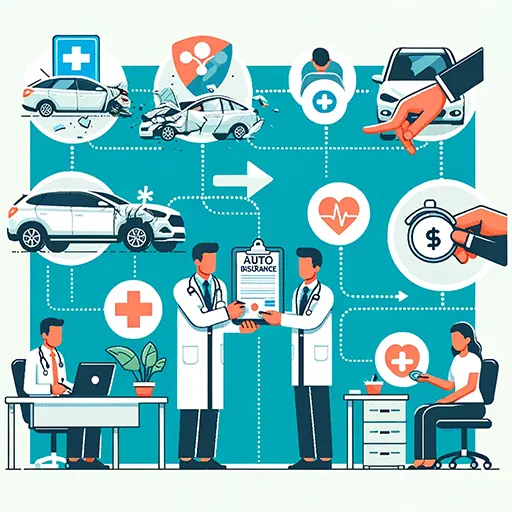
The aftermath of a car accident involves more than just repairs and insurance claims—it’s crucial to prioritize your health. If you’re seeking medical attention for injuries sustained in an auto accident, it’s essential to find a doctor experienced in treating such injuries and who accepts third-party billing. This step is vital in ensuring that your medical expenses are covered without upfront cost to you.
What is Third-Party Billing?
Third-party billing offers a way to cover medical expenses directly through the responsible party’s insurance. This system allows for direct billing to auto insurers, personal injury protection (PIP) plans, or through arrangements like a Letter of Protection (LOP) from an attorney. The key here is that you shouldn’t have to pay out-of-pocket for treatments related to your car accident injuries.
Preparing for Your Doctor’s Visit
Before your appointment, organize your documents and prepare any questions you might have for the doctor. Important information includes:
- The date and details of the accident
- Any citations issued.
- Accident reports
- Previous visits to the ER or urgent care
- Previous treatments for your injuries
- Your insurance information
- If you’re already working with an attorney
Selecting the Right Doctor
When searching for a doctor to handle your car accident-related injuries, online research is invaluable. Look for doctors who specialize in treating auto accident injuries and read reviews from their past patients. Consider:
- The doctor’s experience with personal injury cases
- Their understanding of medical documentation
- The clinic’s willingness to work with third-party billing
- Additional services like transportation for appointments
- The ability to refer to specialists if necessary
Questions to Ask
Ensure the doctor can address your specific needs by asking:
- Do they accept third-party billing?
- Can they treat your specific injuries?
- Are they experienced in documenting injuries for accident cases?
- Can they provide or arrange for transportation to appointments if required?
- Do they have a network of specialists for referrals?
Finding a doctor familiar with auto accident injuries and third-party billing can significantly impact your recovery process. By following these guidelines, you’ll be better positioned to receive the care you need without the added stress and financial strain.
Step 3: Partner with a Doctor who knows Injury Documentation
Imagine transforming your medical records into the most powerful tool for your personal injury claim. Yes, the way your injuries are documented can significantly influence the outcome of your claim, impacting the compensation you receive. Comprehensive documentation of your injuries not only tells the story of your accident and recovery but also sets the stage for a fair settlement.
The Power of Detailed Documentation
Your journey to a settlement begins with the quality of your medical records. Think of these records as a detailed narrative that covers everything from the initial impact to your final day of treatment. This includes:
- A thorough account of the accident and your subsequent injuries
- A complete list of injuries diagnosed and treated
- Documentation of any pre-existing conditions affected by the accident
- Detailed records of all medical evaluations, including X-rays, MRIs, and other diagnostic tests
- Notes on any physical therapy, pain management, or specialist consultations
- Assessments of whether your injuries are temporary or could lead to long-term issues
- Considerations for future medical needs or potential disabilities
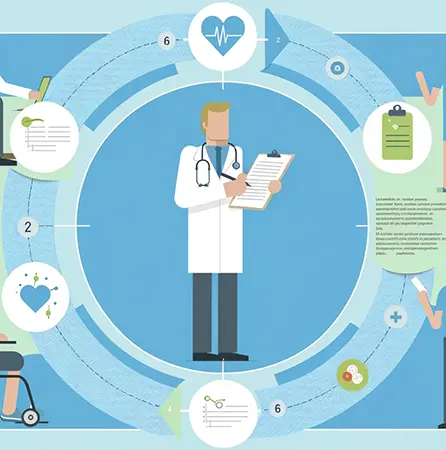
Why It Matters
From the perspective of an insurance company, the more detailed and clear your medical documentation is, the easier it is for them to understand the extent of your injuries and the impact it has had on your life. This is crucial for ensuring that you’re compensated not just for your immediate medical expenses but for any ongoing care or losses related to your accident.
Finding the Right Doctor
The key to achieving this level of documentation lies in choosing a doctor experienced in dealing with auto accident injuries. Unlike standard medical care, documenting personal injury cases requires an eye for detail and an understanding of what insurance companies need to see. This means:
- Choosing a doctor who specializes in treating auto accident injuries and understands the importance of personal injury documentation.
- Ensuring your doctor is thorough in documenting every aspect of your injury and recovery process.
- Working with medical professionals who can anticipate future medical needs and potential impacts on your quality of life.
Your medical records are more than just a file – they’re the foundation of your claim. By ensuring that your injuries are documented accurately and comprehensively, you’re taking a significant step towards securing the compensation you deserve. So, make sure to choose a doctor who not only cares for your recovery but also understands the importance of detailing every step of your journey back to health.
Step 4: Full Disclosure to Your Doctor
Transparency with your healthcare provider about your medical history is not just good practice—it’s crucial for your recovery and any potential problems following a car accident. Here’s why being open about your current and past medical conditions and injuries matters:
Why Your Doctor Needs to Know Everything
- Safety First: Informing your doctor about all past and present medical issues, including any pre-existing conditions, ensures that your treatment plan is safe and effective. For instance, knowing about a previous back surgery is vital before any new treatments or manipulations are considered to prevent further injury.
- Boost Your Claim: Contrary to common concerns, disclosing pre-existing conditions can strengthen your insurance claim. Insurance companies, attorneys, and medical professionals recognize that individuals with pre-existing conditions might face a longer and more complicated recovery process. This understanding can lead to more comprehensive treatment and support.
- Enhance Credibility: Full disclosure establishes your credibility. Omitting information about previous injuries or conditions can cast doubt on your claim, potentially affecting its outcome. Transparency helps to build a trustful relationship with your doctor and bolsters the legitimacy of your claim.
Pre-Existing Conditions: A Double-Edged Sword
Pre-existing conditions often carry a stigma in the insurance world, but they shouldn’t. Being upfront about your medical history can work in your favor:
- More Treatment Options: Acknowledging pre-existing conditions might qualify you for additional treatments, ensuring a thorough recovery.
- Validating Your Claim: Documenting pre-existing conditions before addressing new injuries from a car accident lays a solid foundation for your claim, demonstrating honesty and integrity.
The Bottom Line
Your health and well-being are paramount. Ensuring your doctor has a complete picture of your health enables them to provide the best possible care. Likewise, in the realm of insurance claims, honesty is not just the best policy—it’s the only policy. By being forthcoming about all your medical history, you pave the way for a safer treatment path and a stronger insurance claim. So, when you visit your doctor, remember that sharing the full story of your health is a critical step towards your recovery.
Step 5: Commit to Your Treatment Plan for Optimal Recovery
Achieving Maximum Medical Improvement (MMI) is a critical goal post-accident. Your initial visit to the doctor should arm you with a comprehensive treatment plan, detailing every necessary step towards recovery. This plan, typically including medications, treatments, and consultations with specialists like orthopedic surgeons, neurologists, and physical therapists, this serves as a roadmap to your wellness. It’s also a document that insurance companies scrutinize to confirm adherence to recommended care.
The Importance of Consistent Treatment
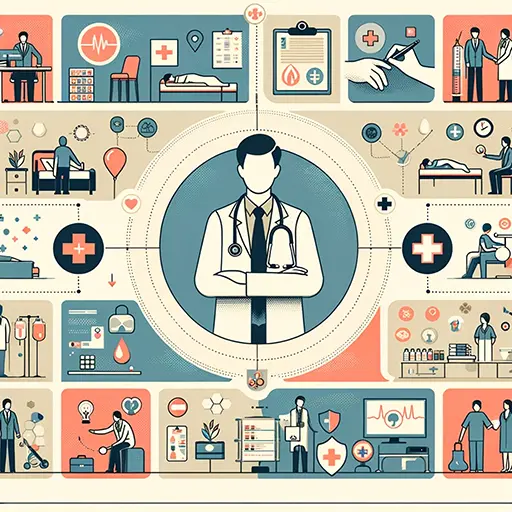
Seeking prompt medical care and sticking to your treatment plan are non-negotiable steps for those seriously injured in car accidents. It’s a common insurance perspective that if you’re not actively pursuing treatment, your injuries might not be as severe as claimed. Hence, continuous care is not only crucial for your recovery but also for validating your personal injury claim.
Why Skipping Treatments Can Cost You
Gaps in treatment are red flags in both your recovery journey and your insurance claim process:
- Reduced Claim Value: Discontinuities in treatment can significantly diminish the perceived value of your claim, potentially affecting the settlement you receive.
- Compromised Recovery: Skipping appointments or treatments can hinder your recovery, leading to prolonged pain or even permanent damage, particularly with injuries prone to causing internal scarring or musculoskeletal damage.
The Role of Your Treatment Plan
Your treatment plan is a testament to the necessity and seriousness of your medical care. It’s evidence for insurance companies that your treatments are not just warranted but crucial for your recovery. Adhering to this plan without interruption not only fosters a smoother recovery but also strengthens your case.
Step 5 Final Thoughts
Consistency in following your doctor’s recommendations post-accident isn’t optional—it’s essential. It’s about giving your body the care it needs to heal and providing clear, documented evidence of your commitment to recovery.
This commitment helps ensure that insurance companies view your claim as legitimate and fully support your journey back to health. Remember, your path to recovery is reflected in your dedication to your treatment plan, so embrace it fully for the best possible outcomes.
Step 6: How a Personal Injury Attorney Can Amplify Your Case
When to Consider Legal Assistance
In the aftermath of a car accident, especially in scenarios requiring extensive medical treatment, the path to recovery can seem daunting. This is where the expertise of a Personal Injury Attorney becomes invaluable.
Such attorneys specialize in advocating for your needs, managing the intricate process of documenting your future medical requirements, and navigating the complexities of insurance claims on your behalf. If your case escalates to court, having an attorney ensures you are represented by someone who understands the stakes and is committed to your best interests.
The Role of Medical Experts in Legal Proceedings
Should your case reach the courtroom, your attorney might need medical experts. These professionals are instrumental in evaluating the impact of your injuries on your daily life and future, including your capacity to work.
They provide critical insights into how your injuries could affect your employment prospects, from securing a job to advancing in your career, potentially influencing the compensation you receive for loss of earnings and future medical care.
Crafting a Comprehensive Care Plan
A cornerstone of your legal representation involves the creation of a Care Plan. This detailed blueprint outlines all anticipated medical interventions you may need, from immediate treatments to long-term care, ensuring a holistic approach to your recovery.
Your attorney, in collaboration with medical professionals, ensures that every aspect of your health and well-being is considered, advocating for a settlement that truly reflects your needs.
Minor Injuries: Is An Attorney Necessary?
It’s a common question: If my injuries are minor, should I still consult an attorney? The short answer is it depends. An initial medical evaluation is crucial to understanding the full extent of your injuries. Often, what seems minor initially may have longer-term implications.
Consulting with a doctor can provide clarity on the severity of your injuries and the necessary treatments, which in turn can help you decide whether legal advice is warranted.
Why Your Doctor’s Opinion Matters
Your physician is more than just a caregiver; they’re a pivotal resource in assessing the necessity for legal support. With a deep understanding of your injuries and recovery path, your doctor can offer guidance on whether seeking legal counsel could benefit your situation. Moreover, they can recommend attorneys experienced in personal injury cases like yours, ensuring you have the right support at every step of your recovery journey.
Making Informed Decisions
Remember, the goal is not just to navigate the legal system but to ensure you receive the care and compensation necessary to support your recovery fully. Whether your injuries are minor or severe, the right legal and medical advice can make all the difference in securing a future where your health and well-being are prioritized.
Navigating Your Accident Medical Care: Essential Q&A

Finding the right medical care after a car accident can be overwhelming. We’ve compiled insights from countless conversations with personal injury victims to answer most questions on finding the right doctor for car accidents.
Finding the Right Doctor for Your Injuries
Q: Which doctor should I visit post-accident?
A: Look for doctors specializing in your specific injury type who also accept third-party billing. Often, this means consulting with professionals in physical therapy, muscle manipulation, and soft tissue injuries, who can then refer you to specialists if more care is needed.
Q: Is a Medical Doctor (MD) my best option?
A: While MDs offer valuable services, many are primary care providers and might not accept third-party billing. Seek integrated medical clinics with a team approach, including physical therapists and chiropractors, for comprehensive care.
Timing and Insurance Concerns
Q: How soon should I see a doctor after an accident?
A: State laws vary, but the general advice is to seek medical attention immediately if you’re in pain. The sooner you get checked, the better your chances of a full recovery.
Q: Can I see a doctor even if I’ve indicated to insurance that I wasn’t hurt?
A: Absolutely. Prioritizing your health is crucial, regardless of initial insurance communications. It’s never too late to seek medical attention if you’re experiencing pain.
Q: What if I’ve already settled my property damage claim?
A: Property damage and injury claims are handled separately. Accepting a settlement for car repairs does not affect your right to seek medical care for injuries.
Symptoms and Documentation
Q: Should I be concerned about new headaches after an accident?
A: Yes, new, or worsening headaches could indicate serious injuries. Consult a doctor immediately to rule out any severe conditions.
Q: Is it necessary to document my symptoms and medication?
A: Documenting every detail of your recovery, including pain levels and medication intake, can significantly strengthen your insurance claim and provide valuable information for potential legal action.
Pre-Existing Conditions and Insurance
Q: What if I have pre-existing injuries?
A: Transparency about your medical history is essential. Accurately reporting pre-existing conditions to your accident doctor ensures you receive appropriate care and bolsters your credibility in insurance and legal matters.
Q: Am I eligible for Personal Injury Protection (PIP) insurance?
A: PIP coverage varies by state. Consult your accident doctor or attorney to understand your eligibility and ensure you don’t miss critical deadlines for medical treatment claims.
Financial Concerns
Q: What if I can’t afford a doctor’s visit?
A: Immediate hospital visits are critical for serious injuries, and hospitals can bill your car insurance directly under PIP or Med Pay coverage. Doctors will also bill third party or work on liens as well. Don’t let financial concerns delay your medical treatment.
Key Takeaways
Selecting the right doctor, understanding the importance of prompt medical care, being upfront about your medical history are pivotal steps in your recovery journey. Remember, your health and well-being are paramount.
Understanding Your Options in States Without PIP Benefits
In areas where Personal Injury Protection (PIP) isn’t available, navigating your medical care after a car accident might seem challenging. However, many car accident doctors offer a solution through a Letter of Protection (LOP) or an attorney-issued Lien.
This agreement involves you, your treating doctor, and your legal representative. It ensures that your doctor is compensated for their services from the settlement of your claim, providing peace of mind for all parties involved.
Connecting You with the Right Doctors
Our mission is to streamline the process of finding qualified accident doctors for individuals who’ve experienced a car accident. Whether you’re dealing with minor injuries or facing a more complex recovery, our expertise lies in matching you with a personal injury doctor.
Best of all, we offer this service at no cost to you, ensuring that you receive the necessary care while we coordinate with your attorney to secure your treatment under an LOP or lien arrangement. Let us help you on your journey to recovery, ensuring you get the care you need without the added stress.



